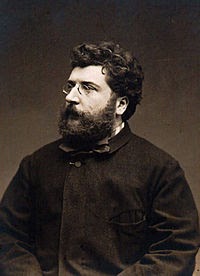| Edit | Map | Home | New Post | New Gallery |
Support
|
 | |
Alexander César Léopold Bizet ( French Alexandre-César-Léopold Bizet , at baptism received the name Georges , French Georges ; October 25, 1838 [1] [2] […] , Rue Louise-Émilie-de-La-Tour- d' Auvergne [d] , Paris , July Monarchy [4] — June 3, 1875 [2] [3] […] , Bouchival [5] [6] […] ) — French composer of the Romantic period, author of orchestral works, romances , piano pieces, as well as operas, the most famous of which was "Carmen". Georges Bizet was born on October 25, 1838 in Paris in the family of singing teacher Adolphe Armand Bizet [7]. He was registered under the name Alexander-César-Leopold Bizet, but for baptism he received the name Georges, by which he was known in the future. At first, he studied music with his mother, Anna Leopoldina Eme (née Delsart). On October 9, 1848, Bizet was enrolled in the Paris Conservatory [8], in the piano class of Antoine Marmontel [9]. Studied counterpoint and fugue with P. Zimmerman (on Marmontel's recommendation) [ source not specified 17 days ], as well as with his replacement, Sh. Gounod (later another Bizet).
Already during his studies at the conservatory (1848-1857), Bizet tried himself as a composer. During this period, he brilliantly mastered compositional technique and performance skill [10] . Ferenc Liszt, who heard his piano music performed by Bizet, exclaimed: "My God! I thought that only one person could do it - me. But it turns out that there are two of us!" [11]
In 1857, he shared the Rome Prize with Charles Lecoq at the competition organized by Jacques Offenbach for the operetta "Doctor Miracle" [12]. In the same year, Bizet presented the cantata "Clovis and Clotilde" to the competition, for which he also received the Rome Prize, which allowed him to live in Rome for three years, writing music and pursuing his education. The opera "Don Procopio" became the report work (the writing of which was obligatory for all laureates of the Rome Prize). The opera was unknown to the public until 1895, when the composer Sh. Malerb published a description of "Don Procopio", which he found in the archive of the deceased director of the Ober conservatory. In 1906, Bizet's first opera was staged at the Monte Carlo Theater in Malerbe's edition (with recitatives written by him).
Except for a period spent in Rome, Bizet lived his entire life in Paris. After his stay in Rome, he returned to Paris, where he devoted himself to writing music. In 1863, he wrote the opera "Pearl Hunters". Hector Berlioz, in an article dedicated to the premiere of the opera, emphasizes that Bizet is not only a composer, but also a pianist of rare talent. The musical writer regretted that Bizet did not give concerts, and emphasized his phenomenal ability to read from a sheet of unknown works of any difficulty [13] . Antoine Marmontel, his teacher, professor and teacher of the piano class at the Paris Conservatory wrote about Bizet's talent as a virtuoso pianist in his memoirs [13]:
He had an exceptional art to nuance the power of the sound, to convey a special singing to it with careful, then intense pressure of the fingers. A finished virtuoso, he was able to shade the melody with varying relief, softening and enveloping it with harmonies of transparent accompaniment, the veiled or emphasized rhythmicity of which obeyed the free phrase of the melody. It was impossible to resist the captivating charm of his charming, gentle and clear carcass.
During this period, he wrote "Beauty of Perth" (1867), the piece for piano "Children's Games" (1870), music for Alphonse Daudet's play "Arlesian" (1872). The premiere of Arlesianka took place on October 11, 1872; neither the play nor the music was successful with the public. The composer turned the music for "Arlesianka" into a concert suite. In 1878, P. I. Tchaikovsky wrote to N. F. von Meck: "By the way, about freshness in music, I recommend you the orchestral suite of the late Bizet "L'Arlesienne". This is a kind of masterpiece. The second suite of music for the play ("Pastoral", "Intermezzo", "Minuet", "Farandola") was composed by Giraud already after Bizet's death.
In 1867, the magazine "Revue Nationale et Etrangère" offered Bizet permanent cooperation as a music reviewer, Bizet's articles are published under the pseudonym Gaston de Betsy. He also wrote the romantic opera Jamile (1870), which is usually considered a precursor to Carmen, and the C major symphony. Bizet himself forgot about it, and the symphony was not mentioned until 1935, when it was found in the library of the conservatory. The symphony is remarkable for its stylistic similarity to the music of Franz Schubert, who was almost unknown in Paris at the time, except perhaps for a few songs.
On June 3, 1869, Georges Bizet married Geneviève Alévy [en] , a cousin of Ludovic Halévy — the creator of the musical genre "operetta". In 1871, Georges and Genevieve had their only son Jacques, who later became a close friend of Marcel Proust [14].
In 1874-1875, the composer worked on the opera "Carmen". In the summer of 1874, in Buzhival, the composer finished the opera, the orchestration of the score took only two months. The premiere of the opera took place in the Paris theater "Opera-Comique" on March 3, 1875 and ended in failure [15]. After the premiere, Bizet is convinced that the work was a failure. He died of a heart attack |
Автор: Sonya Версія: 1 Мова: Англійська Переглядів: 0
|
Коротке посилання: https://www.sponsorschoose.org/a188
Коротке посилання на цю версію: https://www.sponsorschoose.org/n214
Автор - Sonya дата: 2023-05-31 07:15:20
Остання зміна - Sonya дата: 2023-06-03 16:39:42
|